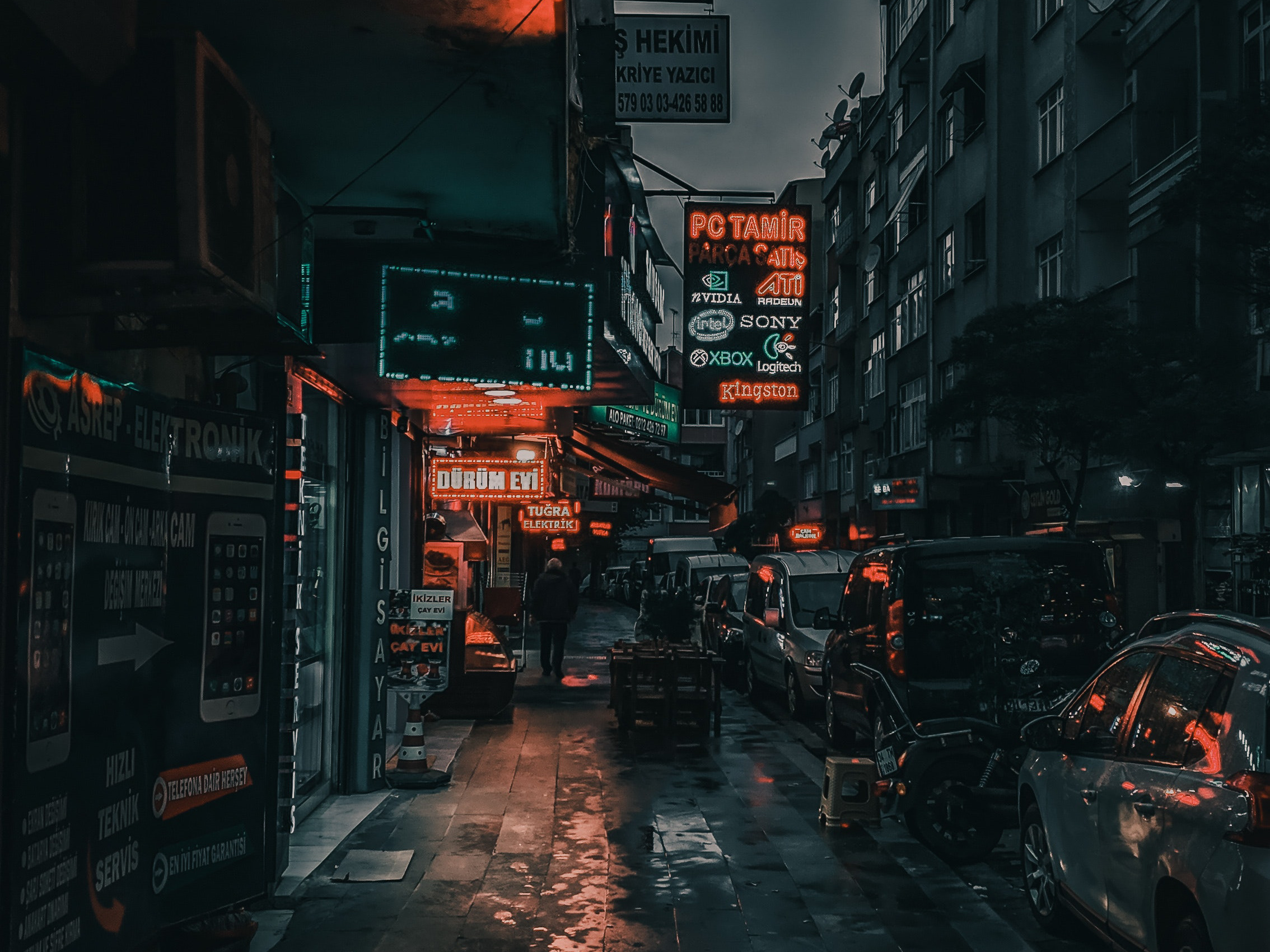I am a soldier. I do not want.
While the Council didn’t select me for the Workforce Section of my dreams—my lanky frame has yet to gain an ounce of muscle in two years, and I think my eggshell bones refuse to mend sheerly out of protest—things could be worse. I could be in the Sanitation Section, referred to with a less savory “s” word by most, or in the Contamination Section, whose latest fleets returned with radiation boils splitting their skin and whose families likely won’t see them leave our installation’s medical ward. Worse still, I could be Sectionless, left to beg outside the fortified walls for scraps of food and enough clothing to fend off the fallout.
I am a soldier. I do not want.
I roll the Military Section’s motto around in my mind, syllables sloshing back and forth like the murky water that pulses against the installation’s ocean-side wall. Raindrops patter along the brim of my patrol cap, and a few stray droplets drip from my tightly knotted bun to my uniform collar. It’s a dreary day but not a dangerous one. The Council’s meteorologists tested the precipitation in the early hours—more rain than rainout—and deemed it safe to carry out Commencement Day. The very words make my stomach somersault.
My boots click against the paved street, and my rifle thumps against my back in unison with the hundred other soldiers marching like ants toward the Capitol. It takes everything in me to keep from making an about-face and sprinting in the opposite direction. I don’t want to be here today. I don’t want to do this today.
I am a soldier. I do not want.
Two years ago, I wasn’t a soldier. I was one of a thousand anxious students seated in the Capitol’s domed lecture hall, scorecard in hand, awaiting the results of my Workforce Section. Averagely intelligent, above averagely artistic, my instructors assumed I would live out my days in the Arts Section, constructing historical depictions of the Council’s greatest achievements for the enjoyment of our citizens. The truth is that our country will always need more soldiers than artists, and there’s no aptitude test necessary to follow orders.
In the end, all Sections follow orders—the Council instructs us, grades us, and decides our Workforce Sections. It chooses how far we advance in our careers, who within our Section we marry, and how many children we’re required to have. Love is an intolerable sickness that prioritizes the individual over the collective. Everything is done for the cause, for the survival of our brothers and sisters at war with the contamination outside the perimeter walls, making personal attachments a liability. Emotion is weakness. Emotion renders you Sectionless.
We reach the marble Capitol building, its prominent dome set against the gray sky like the skull of a giant whose eyes we plucked out and whose nose and mouth we buried in the earth below. My throat constricts as we march through the rightmost orbital socket and into the lecture hall. It reeks of pine and perspiration the same way it had on my Commencement Day, and the wooden seats stuffed with students are a dizzying sea of ashen faces. A Council Leader stands on stage at the center of the circular hall, his hair so white and so fine that I’m not entirely convinced it isn’t a dusting of dandruff over an otherwise bald head.
Our formation halts at the north end of the dome, and though we aren’t authorized to move so much as a muscle, I cannot keep from scanning the aisles of students. I search and search until my azure eyes meet a matching pair in the eighteenth row.
Her thin lips lift in a composed smile, but her eyes are wide and wild. I examine the way her left hand clenches her scorecard while her right clings to her crutches. Her slender legs look skeletal, strapped into their hulking metal braces, and I can tell from the rust stains encircling the joints that Mother and Father haven’t oiled them since I left. But why would they—so dedicated to the cause that they never once celebrated a birthday, didn’t bother showing up to my Commencement Day, and declined to write me a single letter in the two years I’ve been gone—help their youngest daughter tend to the braces that let her walk?
If she’s not strong enough to do it herself, she’s not strong enough for the cause.
Their words never deterred me from sneaking out of bed to oil the small joints by flashlight, nor did they keep me from scouring the streets with her after class for bolts and straps. Because the truth is, no matter what the Council orders or the mottos say, I love her. I loved her the day Mother came home from the medical ward with her tucked in a scratchy, wool blanket, and I’ve loved her every day since. She is the best friend I was never allowed to have, the confidant I was never meant to keep, and the other half of a beating heart that was never mine to share.
And now she’s here, facing the Council’s judgement. I know she’ll get something erudite and never sleep in a tent or shovel the sewers when they clog, but it stings to know she won’t be a soldier. I’d held onto hope that we’d be sent to the same Section—that we would see each other again—but the fantasy is over. I will never know what becomes of her. I won’t know what installation she’s assigned to, I won’t see her grow up, I won’t talk to her again, I won’t—
I swallow my thoughts before they become too poisonous, ignore the heat prickling the corners of my eyes, and force myself to focus on the Council Leader as he rattles off names. Students approach him one by one to hand over their results. He gives each scorecard a cursory glance, ensuring the name and score match the Council’s records, then designates a Section.
Military Section gains three hundred and fourteen cadets from the first four hundred and fifty names. Some look ready for this. Others, like me two years ago, look ready to scream a mistake has been made, that they weren’t meant to see combat, that they were trained in education and the arts—but like me, they’re smart enough to remain quiet.
“Thebe Carter.”
My heart seizes in my chest, air sucked from my lungs like the world finally decided to give in to the crushing vacuum of space, and I am trapped within the ringing box of my ears as she gets to her feet. Where everyone else was silent, she clanks down the staircase like shell casings dumped into empty ammo cans. The stiff braces squeal as her knees bend, and even the stony-faced soldier beside me dares a wince.
An eternity passes before Thebe reaches the stage, and the Council Leader gingerly plucks the scorecard from her hand as if her condition is contagious. My blood boils at the sneer curling his lips as he looks Thebe over, and my fingers—already in fists by my side as I stand at attention—coil so tightly that my nails dig painful crescents into my palms.
“Sectionless.”
No. My throat closes just in time to keep the agonized moan in the pit of my stomach from escaping my mouth. My knees wobble as the lecture hall dims. I sway. I blink. I fail to breathe.
Her condition disqualifies her from the Military, Sanitation, Contamination, and Labor Sections, but those aren’t the only duty assignments. I’ve seen her work complex mathematics in her head, rewire fried electronics, and read at a college level before losing all her baby teeth. She could be an engineer or a researcher for the Medical Section. She could be a records keeper for the Council. There’s simply no way she received a score that would render her Sectionless.
But then again, there’s no way I received a score for anything other than Arts.
If Thebe is as rattled as I am, she doesn’t show it. With more grace than I could ever muster, she steps off the stage and walks toward the two others deemed Sectionless before her. Both sobbing. Both restrained at either arm by guards.
The Council Leader continues his duties as if he hasn’t just shattered my soul like glass, and I am utterly numb by the Commencement’s end. It’s only when my captain barks an order that I return to life.
“Give me six soldiers to escort the Sectionless to the perimeter. Time now.”
He’s barely finished before I fall out of formation. I shoulder-check, I shove, and I do not apologize. Even though I know no one else wants this assignment, I throw myself forward, boots pounding against the stone floor. I’ve never been the best runner—I’ve never been the best anything in my battalion—but I need this more than Contamination Section needs MOPP suits.
I skid into formation, chest heaving and lungs burning, but I pull myself together and lock my gaze straight ahead. There’s a fine line between a sense of duty and wanting this too much. I could be swapped out in a heartbeat if I appear too eager.
The captain eyes me with what my paranoid heart shrieks is suspicion as the Sectionless are brought before us. The guards situate the two, blubbering Sectionless between our first four soldiers, and Thebe is shoved roughly into the space between me and the soldier to my right.
I want to look at her, but I don’t. Her eyes burn into my cheek, and my face reddens from their intensity. But the captain is still watching like a hawk, contemplating whether I am predator or prey, and I cannot afford to be the latter. I flex my jaw, draw my shoulders back, and ignore the bead of sweat tickling my neck.
His sharp gaze leaves mine at last as he commands our small formation to depart. We march from the lecture hall in silence, trading the cool interior of the Capitol for the smattering of rain that’s grown heavier since our arrival.
Thebe’s steps are choppy at my side, and she loses her footing about a hundred yards from the perimeter wall. I break stride to catch her, my calloused hands encasing her back and arms, and warmth like tea on a snowy day bleeds into my veins.
“It’s about time I got your attention,” she whispers, voice so playful—so her—despite the circumstances, I’m unsure whether I want to laugh or cry. “I thought I was going to have to throw my crutches down the storm drain before you’d look at me.”
“You have to keep walking,” I instruct, though my voice doesn’t carry the authority I’ve trained to possess. I withdraw my hands from her, but as I march, I let my knuckles brush hers.
“It’s kinda hard when you and your ginormous friends take one step for every six of mine,” she grumbles, though she keeps up nonetheless.
While her voice sends bolts of joy crackling through my body, the Commencement eats at me like acid rain. By the time we are fifty yards out, my resolve cracks. “What was your score?” I blurt. I can’t live not knowing.
“Forty, forty, thirty-eight, forty,” she answers simply, and I gasp. “I know, right? How does it feel being related to someone so much smarter than you?”
She got a nearly perfect score, my brain screams, and a cold sweat tugs at my skin. What is she doing out here?
“You can’t be Sectionless,” I exclaim, unable to keep my voice down and blatantly ignoring the disgruntled side-eye from the soldier beside us. “That’s impossible.”
Thebe lets out a faux gasp. “Did you, Rhea Carter, just insinuate that the Council is wrong?” She chuckles.
“This isn’t funny, T.”
“I never said it was,” she counters. “But in a world where we don’t get to choose anything, I think I’ll choose to be happy today.”
My heart splinters and the shards puncture my lungs and I find it so, so hard to breathe. We’re at the wall, and two burly guards peel back the iron gate.
“Why would you ever choose to be happy today?” I argue, turning to her only to find her already peering up at me, eyes shimmering with a light that shouldn’t be there.
“Because today I get one more talk with you, and what’s better than that?” She flashes me a quick, brilliant smile before slipping past me for the gate.
While the other two wailing Sectionless are thrown over the threshold into the muddy grass, Thebe waltzes forth. As she passes through the perimeter, she takes a moment to trace her hand along the gray stone as if painting it with her fingertips, then turns back to me.
One of the gate guards shouts an order, and the iron gate begins its heavy, lurking return journey. Thebe waves goodbye as the first bar passes before her face, and my vision blurs. My eyes are hot, my lungs are on fire, and I can’t remember what oxygen tastes like.
I am a soldier. I do not want.
What an ugly lie.
For one endless heartbeat, I am no longer in control. My rifle sling rubs across the nape of my neck, and a second later, the icy chill of the weapon sweeps across my hands. I don’t register moving my lips, but I hear my voice demanding the guards to stop the gate. The gravel walkway to the outside is a thousand miles away as it crunches underfoot, and while the rain weighs down the dirty-blonde curls framing Thebe’s face, I don’t feel a single drop.
A gate guard stretches forth his hand, and the world clicks back into place. I swing my body to face him and jerk away from his reach. The rifle trembles in my grip as I point it at his chest. I don’t know that I would shoot him. I don’t know that I wouldn’t.
Eyes trained on him, I slip through the narrow opening between the gate and the wall and slowly backstep until I’m at Thebe’s side. As soon as I’m through, the gate grinds shut with the thunderous echo of finality.
“Fancy meeting you here,” Thebe remarks, as if I didn’t just throw away my career, my only source of food and potable water, and my shelter from the contamination outside for the one thing we’re trained since birth not to yield to. “Why’d you decide the grass is greener on my side?”
I don’t know, I want to say, but that’s not true. Because I love you, and I can’t stay in there knowing you’re out here, I want to say next, but that doesn’t feel right either. Instead, I return the rifle to its home between my shoulder blades and answer, “Because, in a world where we don’t get to choose anything, I choose you.”
Photo Credit: Fabiano Rodrigues
Based on the Reedsy prompt, "Set your story in a world where love is prohibited."





